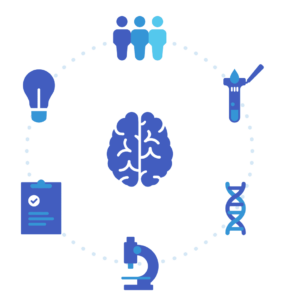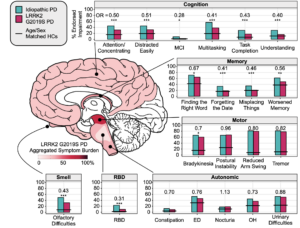In early July, President Biden signed into law the National Plan to End Parkinson’s Act. This is a monumental step forward for the scientists at 23andMe and the millions living with Parkinson’s disease. Seeing this bipartisan legislation become law is heartening, as it will bolster efforts to find new treatments and ultimately cure Parkinson’s.

23andMe launched its Parkinson’s Research effort 15 years ago, leveraging its unique research model to aid in the fight against this disease. For many of us, this research is personal—we have family members or loved ones living with Parkinson’s. Along with our ongoing research, 23andMe was the first direct-to-consumer genetic testing company to offer reports authorized by the FDA that estimated a person’s genetic likelihood of developing Parkinson’s disease.
We’ve continued that commitment to our customers and toward important Parkinson’s research. More than 37,000 people with Parkinson’s are part of our Parkinson’s Research community. That community and the millions of 23andMe customers who have consented to participate in our research make this work possible. Together, we’ve published over two dozen papers. Collaborating with the Michael J. Fox Foundation (MJFF) and the Parkinson’s Foundation, we are getting closer daily to our goal of ending Parkinson’s.
Modeled after the National Alzheimer’s Project Act (NAPA) of 2011, the new law will direct more attention and funding toward Parkinson’s research, just as NAPA did for Alzheimer’s. In the last year, two new treatments have been approved by the FDA to treat early Alzheimer’s, and there are now some new tests that help with earlier diagnosis of the disease. The hope is that the National Plan to End Parkinson’s Act will lead to similar breakthroughs for treating and diagnosing Parkinson’s disease.
We talked to a few of the 23andMe scientists working on Parkinson’s research to get their reaction to the new law and what it may mean for new treatments for Parkinson’s disease.
Promising New Research
Hopefully, this new law will spur additional funding for Parkinson’s research. Looking at all the Parkinson’s research, including work by 23andMe researchers on topics such as LRRK2 G2019S, the microbiome, and Parkinson’s and Parkinson’s in non-European populations, what are you most excited about in current Parkinson’s research?

23andMe PD Research Team: The Parkinson’s research landscape is expanding into so many promising areas that choosing just one is difficult! A few of our top research priorities at this time include exploring Parkinson’s genetic insights into multi-ancestry populations, early Parkinson’s disease detection, and the importance of gut/saliva microbes. Scientists are developing accessible assays of alpha-synuclein—the protein that misfolds and is associated with the development of Parkinson’s—that will aid in early detection and spur further insights into disease progression. There is still so much work to do, and we are excited to contribute research in genetics, ancestry, and the microbiome to understand Parkinson’s biology and pathology further.
The Alzheimer’s Research Example
The new law was modeled after the National Alzheimer’s Project Act. What do you see as a parallel with Alzheimer’s research, and where does the comparison diverge?
23andMe PD Research Team: Both Alzheimer’s and Parkinson’s are neurodegenerative diseases that pose real challenges to the patients living with them, as well as to the researchers trying to find a breakthrough. Both diseases currently have treatments that primarily address symptoms rather than cure the disease, so both camps of researchers are actively looking for a breakthrough. The etiologic and clinical details can be different—for example, PD often begins with motor symptoms while AD’s early manifestations are more cognitive—but the commonalities in studying the two conditions are much more pronounced.
23andMe’s Parkinson Research
23andMe has been studying Parkinson’s disease since 2009, and our findings have been published in more than two dozen papers. Is there a big takeaway from all that work and the ongoing work on Parkinson’s?

23andMe PD Research Team: Before the 21st century, genetics were thought to have little to no influence on Parkinson’s disease. Thanks to the advent of sequencing technologies, we have learned a great deal about the genetic underpinnings of Parkinson’s. 23andMe has been an essential contributor to Parkinson’s genetics research due to our unique and large customer base that is highly engaged in research. The big takeaway from our science has been the identification of ~90 genes that are associated with the risk of Parkinson’s. With each decade that passes, we are learning more and more about how genetics influences Parkinson’s disease risk and symptoms. This knowledge is the foundation used to develop genetic testing and improve early detection of Parkinson’s disease, identify new drug targets, and develop new medications.
Collaborations
For almost our entire Parkinson’s research program, 23andMe has collaborated with the Michael J. Fox Foundation and the Parkinson’s Foundation. We’ve also collaborated with some academic institutions and the NIH. Where are we most interested in collaborating on areas around Parkinson’s disease? Will we likely see access to this dataset expanded to more qualified researchers?
23andMe PD Research Team: Scientific collaboration is crucial to succeed in Parkinson’s research. We are interested in continuing our support and collaboration with ongoing studies, including The Michael J. Fox Foundation’s PPMI and The University of Rochester’s VALOR-PD studies. We are excited to contribute to Radboud University Medical Center’s Slow-SPEED study—the first-ever remote exercise intervention in prodromal Parkinson’s. We are also excited to explore the capabilities of wearable devices in detecting early Parkinson’s and cognitive games to monitor brain health over time. The 23andMe Research Team is committed to supporting researchers while protecting the privacy of our customers and research participants.
LRRK2 Study
Recently, 23andMe published findings focusing on those with the LRRK2 variant and Parkinson’s. The study highlights how the disease affects people differently. What more can you say about LRRK2 and how the disease doesn’t necessarily affect all people similarly?
23andMe PD Research Team: We showed that the LRRK2 G2019S variant increases one’s risk of Parkinson’s. However, not everyone with the mutation will develop Parkinson’s. Furthermore, we saw that this increased risk was partly explained by other genes. The cumulative effect of these other genes, called a polygenic risk score, further explained this variability in Parkinson’s risk in LRRK2 G2019S carriers. Therefore, LRRK2 can affect people differently, and this has to do with both our background genetic makeup and our environment.
Research Participants
All our work is possible because people with Parkinson’s have chosen to participate in this research. We also have about 12 million customers who’ve consented to participate in research. What would you like to say to those people with Parkinson’s who are research participants? What about those who do not have Parkinson’s? How is their participation helpful for what you do?
23andMe PD Research Team: We want to thank all of our customers for taking the time to participate in 23andMe research. Without you, progress in Parkinson’s research would not be possible. Genetic analyses require thousands of research participants to glean robust insights. We’re grateful to have such an engaged customer base committed to research. We want everyone to access, understand, and benefit from the human genome. This all starts with research.
Motivation
Many of us here at 23andMe have family members who are living with or lived with Parkinson’s disease. Does that help motivate you to do the research you are doing?
23andMe PD Research Team: Absolutely. One of our core values is ‘behind every data point is a human being.’ That comes naturally when so many of us have personal connections to PD. Research in service of better quality of life and treatment options for people just like our loved ones is our North Star.
The Value of Knowing
We also know 23andMe customers are interested in their Genetic Health Risk report on Parkinson’s Disease. Not everyone wants to learn this information. However for those who do, what do you see as the value of learning that you may have a genetic risk for Parkinson’s disease?
23andMe PD Research Team: The benefits for those who learn about their genetic risk can be tangible. Knowing genetic risk can lead to more proactive health monitoring and early detection. Also, individuals with a known genetic predisposition to PD may consider genetic counseling to understand the implications for their children and other family members. Finally, some individuals find value in being mentally and emotionally prepared for the possibility of developing Parkinson’s disease.




